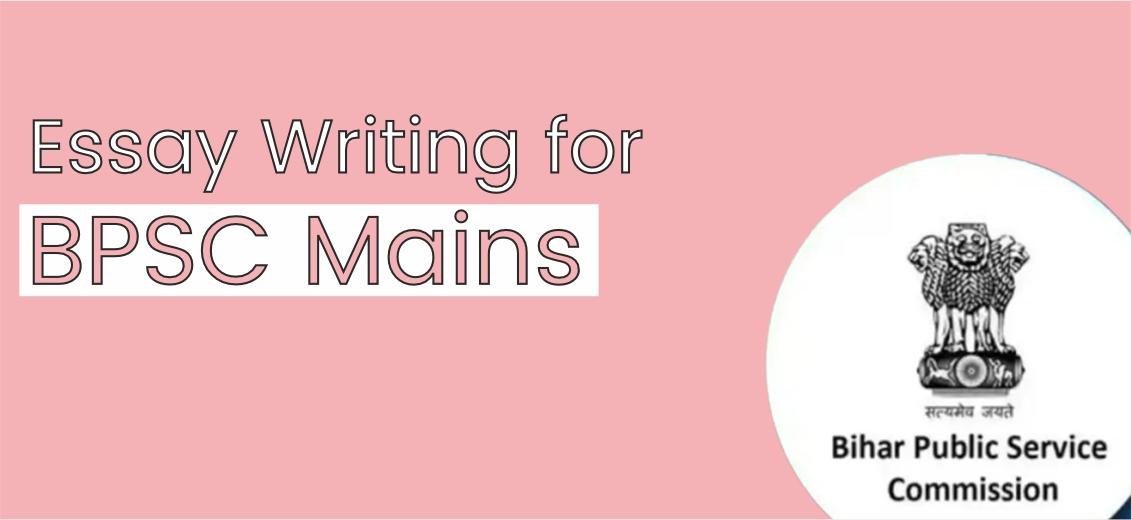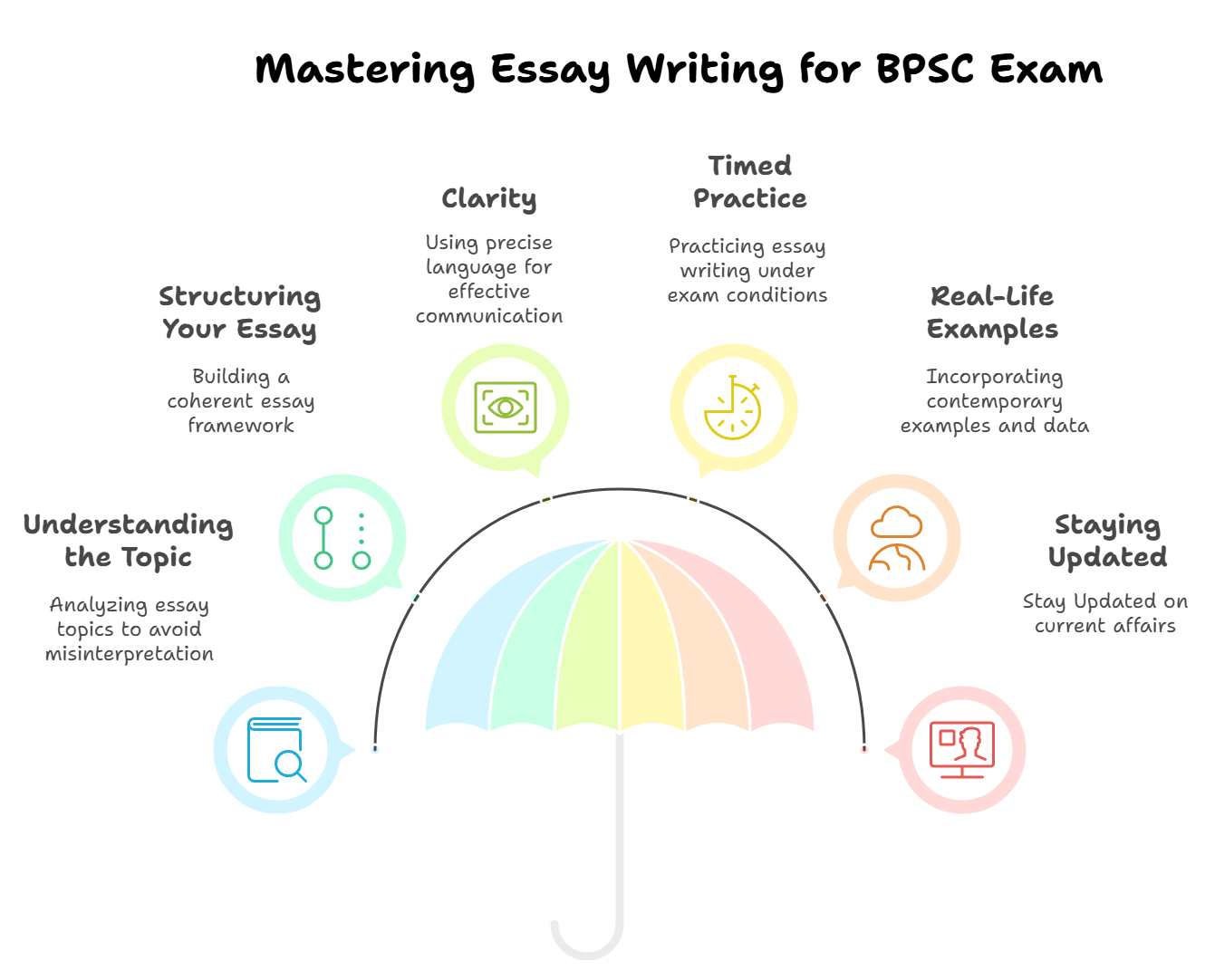Essay Writing for BPSC Mains: Important Topics & Best Approach
Blogs Home
- 27 Feb 2025

The Bihar Public Service Commission (BPSC) Mains examination is a crucial stage for aspirants aiming to join the Bihar state administrative services. Essay in mains paper aims to assess candidates' writing skills and ability to articulate complex ideas clearly.
This blog provides a step-by-step strategy, detailed guide on important topics, the best approach and resources for mastering essay writing in BPSC Mains.
Exam Pattern and Marking
Essay paper carries a total 300 marks and is structured into 3 sections, each worth 100 marks. Candidates are typically given 12 essay topics (4 in each section), selecting one topic from each section to write about.
The duration of the exam is 3 hours, providing ample time to develop well-structured and insightful essays. Evaluation is based on clarity, coherence, structure, and depth of knowledge, making it essential to present well-articulated arguments with a logical flow.
Important Essay Topics
The BPSC Mains essay paper often features a diverse range of topics covering social, economic, political, historical, and environmental issues. While the exact topics may vary, aspirants should focus on key themes relevant to Bihar and national developments.
- Social Issues:
- Women empowerment and gender equality
- Caste system and social justice in Bihar
- Education, skill development, and unemployment
- Role of youth in nation-building
- Economy & Science & Technology:
- Agriculture & Rural Economy
- MSMEs & Industrial Growth
- Inclusive Growth, Financial Inclusion, Digital Economy
- Space Science & Technology, AI & Automation
- Biotechnology & Healthcare
- Climate Technology
- Political & Governance Issues:
- Panchayati Raj system and grassroots governance
- Corruption, transparency, and electoral reforms
- Federalism, cooperative governance, and role of civil services
- Historical & Cultural Themes:
- Bihar’s role in India’s freedom struggle
- Cultural heritage, literature (Maithili & Bhojpuri), and festivals
- Influence of Buddhism and Jainism in Bihar
- Environmental & Sustainability Issues:
- Climate change and disaster management in Bihar
- Water conservation, river pollution (Ganga & Kosi), and urbanization
- Renewable energy and sustainable development
- Proverbs-Based Essays:
- One section is entirely dedicated to proverb-based essays such as
- बिन समाज के बोली हो सकेला का, बिन बोली (भाषा) समाज हो सकेला का !
- धोबियक कुकुर में घर के ने घाट के
- आगु नाथ नै पाछू पगहा, बिना छान के कूदे गधा
- अनेर धुनेर के राम रखवार
- One section is entirely dedicated to proverb-based essays such as
Tips & Strategy
Understanding the Topic: Read Between the Lines
Before you start writing, analyzing the topic is crucial. Many candidates misinterpret essay topics, leading to off-track content. Here’s how to approach it:
- Break down the topic into key components (social, political, economic, ethical aspects).
- Identify the type of essay—is it analytical, descriptive, argumentative, or reflective?
- Think of relevant dimensions—historical background, causes, impact, solutions, and the way forward.
- Use a structured brainstorming technique, such as the SPECIAL Approach:
- S – Social
- P – Political
- E – Economic & Environmental
- C – Cultural
- I – International
- A – Administrative
- L – Legal
Pro Tip: Before writing, jot down 5-6 key points that will form the backbone of your essay. This will help in maintaining coherence and avoiding repetition.
Structuring Your Essay: Build a Strong Framework
A well-structured essay is like a well-built house, it needs a solid foundation, a well-defined structure, and a strong conclusion.
The introduction sets the stage for your essay, making the first impression crucial. Begin with a thought-provoking quote, anecdote, or fact to instantly engage the reader. Clearly define the topic and provide a brief context to establish its relevance. Finally, conclude with a thesis statement that outlines the essay’s scope, ensuring clarity and direction for the discussion ahead.
- For Example: For an essay on “Women Empowerment,” start with Dr. B.R. Ambedkar’s quote: “I measure the progress of a community by the degree of progress women have achieved.”
A well-structured body forms the backbone of your essay. Divide it into clear sections with subheadings for better readability and logical flow—begin with the historical background, then discuss causes, impact, solutions, and future outlook. Strengthen your arguments with facts, data, and real-life examples to add credibility. Maintain a balanced perspective by acknowledging counterarguments and addressing them with logical rebuttals. A structured and evidence-based approach ensures clarity and depth in your analysis.
Wrap up your essay by summarizing key points concisely without repeating arguments. End with a forward-looking statement, policy recommendation, or a relevant quote that reinforces your stance. Keep the tone optimistic and solution-oriented, leaving the reader with a strong and thoughtful takeaway.
- Example: An essay on climate change can be concluded with a famous quote like “The earth provides enough to satisfy every man's need, but not every man's greed." ~(MK Gandhi)
Clarity is Key
A great essay is not just about knowledge but how effectively you present it. Use simple and precise language, avoiding unnecessary jargon that may confuse the reader. Keep your writing concise and impactful, focusing on quality over quantity. Maintain a formal and balanced tone, steering clear of extreme views.
To make your essay engaging, incorporate idioms, analogies, and rhetorical questions where appropriate, ensuring your arguments are both persuasive and thought-provoking.
Practice Under Timed Conditions
To excel in essay writing, practice under real exam conditions by setting aside three hours for full-length essays. Focus on maintaining speed, coherence, and proper structuring while staying within the word limit. Use previous years' essay topics to simulate the actual exam environment, helping you build confidence and improve time management.
- Pro Tip: Maintain a notebook of essay introductions, quotes, and examples to enhance your content bank.
Incorporate Real-Life Examples & Data
Enhance your essay by linking arguments to contemporary events, recent government schemes, policies, and global trends. Citing official reports like those from NITI Aayog, the Economic Survey, NCRB, and Census data adds credibility and depth to your analysis, making your arguments more compelling and well-grounded.
- Example: For an essay on financial inclusion, mention PM Jan Dhan Yojana and RBI reports on digital banking trends.
Stay Updated with Current Affairs
Regularly reading newspapers like The Hindu and Indian Express, along with Bihar-specific news, helps you stay informed on relevant issues. Follow editorials to gain diverse perspectives and strengthen your arguments. Maintain short notes on socio-economic and political topics, ensuring you have well-rounded points to enrich your essays.
- Pro Tip: Use the “PREP” strategy (Point, Reason, Example, and Policy) to structure arguments effectively.
Strategy for Proverb-Based Essays
- Understand the Meaning: Start by interpreting the proverb in simple words. Identify its core message, which is often related to society, morality, or governance.
- Contextual Relevance: Link the proverb to real-life scenarios, cultural traditions, and social structures of India.
- For example, "धोबियक कुकुर ने घर के ने घाट के" (A washerman’s dog belongs neither to home nor the riverbank) can be used to discuss identity crises, indecisiveness, or political dilemmas.
- Expand with Examples: Use historical, economic, and political references to substantiate your points – India in general and Bihar in particular.
- Philosophical and Literary Angle: Many proverbs have deep philosophical or literary roots. Mention how they reflect human nature, ethics, or behavioral traits.
- Modern-Day Relevance: Relate the proverb to contemporary issues such as governance failures, environmental concerns, economic policies, or social justice movements.
- Structured Approach:
- Introduction: Explain the proverb and its general meaning.
- Main Body: Discuss its application in different contexts (social, economic, political, ethical).
- Conclusion: Summarize its importance and relevance in today’s world.
- Practice Writing: Regularly write essays on similar proverbs from Bihar, analyzing their deeper meaning and applicability.
Common Mistakes to Avoid
Avoiding common pitfalls can significantly enhance the quality of your essay. Here are some key mistakes to watch out for:
- Skipping the Planning Stage: Always outline key points before writing to maintain clarity and direction.
- Lack of Conciseness: Stick to the point; avoid unnecessary elaboration and repetitive ideas.
- Overuse of Facts: Facts should support your argument, not dominate the essay. Use them strategically.
- Poor Flow and Coherence: Ensure smooth transitions between paragraphs for logical progression.
- Neglecting Revision: Allocate 5-10 minutes for proofreading to refine the content and correct errors.
Conclusion
Mastering essay writing for the BPSC Mains exam demands a blend of knowledge, critical thinking, and effective communication. A structured approach, regular practice, and incorporating strategic techniques can significantly enhance your performance. Consistent writing, self-evaluation, and feedback play a crucial role in refining your skills.
Drishti IAS provides valuable resources for structured preparation. By leveraging the right strategies and staying disciplined, aspirants can confidently tackle the essay paper and excel in the BPSC Mains exam.
Blogs Home


.png)
.jpg)



